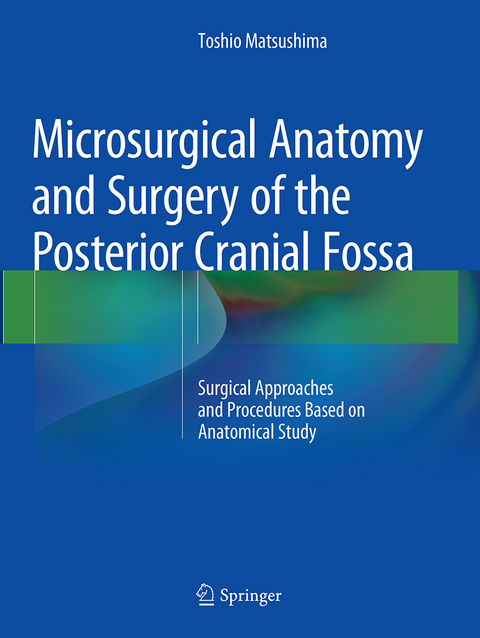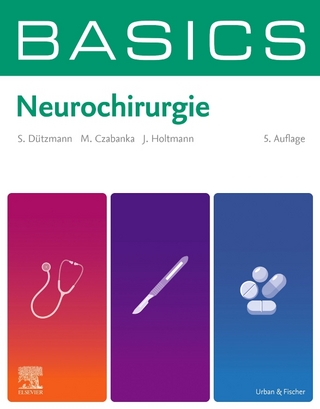
Microsurgical Anatomy and Surgery of the Posterior Cranial Fossa
Springer Verlag, Japan
978-4-431-56119-4 (ISBN)
This book describes the anatomy of the posterior fossa, together with the main associated surgical techniques, which are detailed in numerous photographs and step-by-step color illustrations.
The book presents approaches and surgical techniques such as the trans-cerebellomedullary fissure approach and its variation to the fourth ventricle, as well as the cerebellomedullary cistern, infratentorial lateral supracerebellar approach to the fifth cranial nerve in the upper cerebellopontine angle, infrafloccular approach to the root exit zone of the seventh cranial nerve, transcondylar fossa approach through the lateral part of the foramen magnum, and the stitched sling retraction technique utilized during microvascular decompression procedures for trigeminal neuralgia and hemifacial spasm. It also describes in detail the bridging veins of the posterior fossa, especially the petrosal vein, and bridging veins to the tentorial sinuses, which can block approaches to the affected area.
Each chapter begins with an anatomical description of the posterior fossa, after which the respective surgical approaches are explained in an easy-to-follow manner.
The original Japanese version of this work was published 8 years ago, and has established itself as a trusted guide, especially among young neurosurgeons who need to study various surgical approaches and techniques. In the course of being translated into English, some sections have been revised and new information has been added. The author hopes that the book will help neurosurgeons around the world perform safer operations with confidence.
Chapter 1. The “Rules of Three” in the Posterior Cranial Fossa.- Chapter 2. Neural Structures: the Brainstem, Cerebellum, Cerebellar Peduncles, and Fourth Ventricle.- Chapter 3. Three Cerebellar Arteries: Superior Cerebellar Artery, Anterior Inferior Cerebellar Artery, and Posterior Inferior Cerebellar Artery.- Chapter 4. The Veins of the Posterior Cranial Fossa: Nomenclature.-Chapter 5. The Bridging Veins in the Posterior Cranial Fossa.- Chapter 6. Midline Suboccipital Approach and Its Variations for Fourth Ventricular or Cerebellar Hemispheric Lesions.- Chapter 7. Microsurgical Anatomy of the Cerebellomedullary Fissure and Variations of the Transcerebellomedullary Fissure Approach.- Chapter 8. The Cerebellopontine Angle: Basic Structures and the “Rules of Three”.- Chapter 9. The Retrosigmoid Lateral Suboccipital Approach: Basic Approach and Variations.- Chapter 10. Anatomy for Microvascular Decompression Procedures: Relationships between Cranial Nerves and Vessels, Preoperative Images, and Anatomy for the Stitched Sling Retraction Technique.- Chapter 11. Microvascular Decompression Surgery for Trigeminal Neuralgia: Special Reference to the Infratentorial Lateral Supracerebellar Approach Using the Tentorial Stitched Sling Retraction Method.- Chapter 12. Microvascular Decompression Surgery for Hemifacial Spasm: the Lateral Suboccipital Infrafloccular Approach.- Chapter 13. Microvascular Decompression for Glossopharyngeal Neuralgia: Surgical Approaches Depending on the Offending Artery.- Chapter 14. Microsurgical Anatomy of the Internal Auditory Canal and Surrounding Structures and Vestibular Schwannoma Surgery.- Chapter 15. Meningiomas of the Cerebellopontine Angle: Classification and Differences in the Surgical Removal of Each Type through the Lateral Suboccipital Retrosigmoid Approach.- Chapter 16. Surgical Anatomy of the Posterior Part of the Foramen Magnum and the Posterior Paramedian Approaches.- Chapter 17. Surgical Anatomy of and Approaches through the Lateral Foramen Magnum: the Transcondylar Fossa and Transcondylar Approaches.- Chapter 18. The Temporal Bone: Basic Anatomy and Approaches to Internal Auditory Canal.- Chapter 19. Posterior and Anterior Transpetrosal Approaches.- Chapter 20. Microsurgical Anatomy of and Surgical Approaches to the Jugular Foramen.- Chapter 21. Occipital Artery–Posterior Inferior Cerebellar Artery Bypass Surgery.
“This is an excellent microanatomical description of the central nervous system structures located on the posterior fossa. This book can be recommended for neurosurgeons and residents, as well as for use as a supplementary book on the anatomy and physiology of the posterior fossa structure.” (Manuel Dujovny, Doody's Book Reviews, June, 2015)“This is a comprehensive text and full color atlas of Posterior fossa neurosurgery that is a correlative anatomy intraoperative approach. … This book is truly outstanding and warrants consideration in the library desk of every neurosurgeon, both young and experienced in training. Residents, vascular fellows, and experienced neurosurgeons will find this book helpful in their academic practice.” (Joseph J. Grenier, Amazon.com, April, 2015)
| Erscheinungsdatum | 27.10.2016 |
|---|---|
| Zusatzinfo | 202 Illustrations, color; 20 Illustrations, black and white; XXV, 314 p. 222 illus., 202 illus. in color. |
| Verlagsort | Tokyo |
| Sprache | englisch |
| Original-Titel | Kouzugaika no Bisyougekakaibo to Syujyutsu |
| Maße | 210 x 279 mm |
| Themenwelt | Medizinische Fachgebiete ► Chirurgie ► Neurochirurgie |
| Medizin / Pharmazie ► Medizinische Fachgebiete ► HNO-Heilkunde | |
| Studium ► 1. Studienabschnitt (Vorklinik) ► Anatomie / Neuroanatomie | |
| Schlagworte | neurosurgery • Posterior Fossa • Surgical Anatomy |
| ISBN-10 | 4-431-56119-6 / 4431561196 |
| ISBN-13 | 978-4-431-56119-4 / 9784431561194 |
| Zustand | Neuware |
| Informationen gemäß Produktsicherheitsverordnung (GPSR) | |
| Haben Sie eine Frage zum Produkt? |
aus dem Bereich


